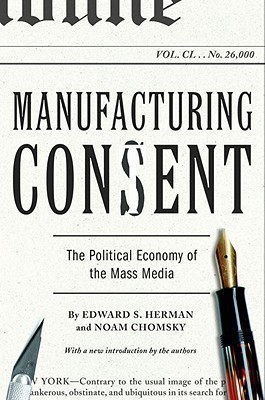More on this book
Community
Kindle Notes & Highlights
Started reading
September 11, 2024
The beauty of the system, however, is that such dissent and inconvenient information are kept within bounds and at the margins, so that while their presence shows that the system is not monolithic, they are not large enough to interfere unduly with the domination of the official agenda.
The culture and ideology fostered in this globalization process relate largely to “lifestyle” themes and goods and their acquisition; and they tend to weaken any sense of community helpful to civic life. Robert McChesney notes that “the hallmark of the global media system is its relentless, ubiquitous commercialism.”
The steady advance, and cultural power, of marketing and advertising has caused “the displacement of a political public sphere by a depoliticized consumer culture.”
But entertainment has the merit not only of being better suited to helping sell goods; it is an effective vehicle for hidden ideological messages.24 Furthermore, in a system of high and growing inequality, entertainment is the contemporary equivalent of the Roman “games of the circus” that diverts the public from politics and generates a political apathy that is helpful to preservation of the status quo.
There is little reason to believe that they would not like to understand why they are working harder with stagnant or declining incomes, have inadequate medical care at high costs, and what is being done in their name all over the world. If they are not getting much information on these topics, the propaganda model can explain why: the sovereigns who control the media choose not to offer such material.
This bias is politically advantageous to U.S. policy-makers, for focusing on victims of enemy states shows those states to be wicked and deserving of U.S. hostility; while ignoring U.S. and client-state victims allows ongoing U.S. policies to proceed more easily, unburdened by the interference of concern over the politically inconvenient victims.
“Genocide” is an invidious word that officials apply readily to cases of victimization in enemy states, but rarely if ever to similar or worse cases of victimization by the United States itself or allied regimes.
it remains a central truth that democratic politics requires a democratization of information sources and a more democratic media.
Advertisers will want, more generally, to avoid programs with serious complexities and disturbing controversies that interfere with the “buying mood.” They seek programs that will lightly entertain and thus fit in with the spirit of the primary purpose of program purchases—the dissemination of a selling message.
a propaganda model suggests that the “societal purpose” of the media is to inculcate and defend the economic, social, and political agenda of privileged groups that dominate the domestic society and the state. The media serve this purpose in many ways: through selection of topics, distribution of concerns, framing of issues, filtering of information, emphasis and tone, and by keeping debate within the bounds of acceptable premises.
In sum, the mass media of the United States are effective and powerful ideological institutions that carry out a system-supportive propaganda function by reliance on market forces, internalized assumptions, and self-censorship, and without significant overt coercion.


